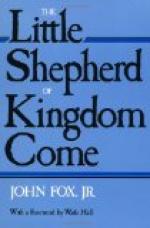Chad shrank back, half distressed and half happy, and only a hail outside from the first of the coming guests saved him from utter confusion. Once started, they came swiftly, and in half an hour all were there. Each got a hearty welcome from old Joel, who, with a wink and a laugh and a nod to the old mother, gave a hearty squeeze to some buxom girl, while the fire roared a heartier welcome still. Then was there a dance indeed—no soft swish of lace and muslin, but the active swing of linsey and simple homespun; no French fiddler’s bows and scrapings, no intricate lancers, no languid waltz; but neat shuffling forward and back, with every note of the music beat; floor-thumping “cuttings of the pigeon’s wing,” and jolly jigs, two by two, and a great “swinging of corners,” and “caging the bird,” and “fust lady to the right cheat an’ swing”; no flirting from behind fans and under stairways and little nooks, but honest, open courtship—strong arms about healthy waists, and a kiss taken now and then, with everybody to see and nobody to care who saw. If a chair was lacking, a pair of brawny knees made one chair serve for two, but never, if you please, for two men. Rude, rough, semi-barbarous, if you will, but simple, natural, honest, sane, earthy—and of the earth whence springs the oak and in time, maybe, the flower of civilization.
At the first pause in the dance, old Joel called loudly for Chad. The boy tried to slip out of the door, but Dolph seized him and pulled him to a chair in the corner and put the banjo in his hands. Everybody looked on with curiosity at first, and for a little while Chad suffered; but when the dance turned attention from him, he forgot himself again and made the old thing hum with all the rousing tunes that had ever swept its string. When he stopped at last, to wipe the perspiration from his face, he noticed for the first time the school-master, who was yet divided between the church and the law, standing at the door, silent, grave, disapproving. And he was not alone in his condemnation; in many a cabin up and down the river, stern talk was going on against the ungodly ‘carryings on,’ under the Turner roof, and, far from accepting them as proofs of a better birth and broader social ideas, these Calvinists of the hills set the merry-makers down as the special prey of the devil, and the dance and the banjo as sly plots of the same to draw their souls to hell.
Chad felt the master’s look, and he did not begin playing again, but put the banjo down by his chair and the dance came to an end. Once more Chad saw the master look, this time at Sintha, who was leaning against the wall with a sturdy youth in a fringed hunting-shirt bending over her—his elbow against a log directly over her shoulder, Sintha saw the look, too, and she answered with a little toss of her head, but when Caleb Hazel turned to go out the door, Chad saw that the girl’s eyes followed him. A little later, Chad went out too,




